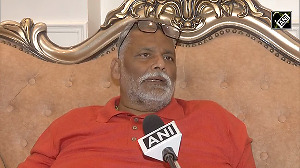A sessions court in Mumbai found nine of the 17 people being tried for the Best Bakery case guilty of rioting and murder and slapped life imprisonment on them. If you are wondering why it is so important, read on:
What is the Best Bakery case all about?
On March 1, 2002, a violent mob of about 500 people, according to testimonies to the National Human Rights Commission and the police -- killed 14 people at the Best bakery, a small outlet in the Hanuman Tekri area of Vadodara.
Why is it so sensational?
The Best Bakery Case has come to symbolise the carnage -- and the alleged complicity of the state government in it -- that followed in Gujarat after the Sabaramati Express was set afire in Godhra in 2002 killing more than 50 pilgrims returning from Ayodhya.
In fact, in December 2003, after being rapped on the knuckles by the Supreme Court, the Gujarat state government admitted there were lapses in the investigations into the case and that the police had bungled in recording evidence.
Also, the Best Bakery, case, like the Jessica Lal case, was considered an open and shut case because there were eye-witnesses. And like the Lal case, it saw witnesses turning hostile, allowing the accused to walk free, till Friday's judgment.
Zaheera Sheikh, then a 19-year-old, who saw her family members burnt to death, became one of the two faces of the Gujarat riots that killed more than 1,000 people. The other being a tailor from Ahmedabad, Qutubuddin Ansari, whose picture -- weeping, with folded hands, begging for mercy -- became one of the haunting images of the riots.
Zaheera recounted the incident for countless publications. How the mob gathered, how they were shouting communal slogans, how she and and her family fled to the terrace. How some locked themselves in a first floor room. How the mob set fire to the bakery. How the dance of death continued from 6 pm to 10 am the next day. Zaheera also filed a police report, naming the accused.
Why was the Gujarat case tried in Maharashtra?
The case was the first one to be handled by a special fast-track court in Gujarat.
On March 17, 2003, Zaheera stunned everyone by saying in court she did not see anyone of the mob because she was hiding from it. She was not the only one who changed her statement. As many as 37 out of the 73 witnesses turned hostile.
On June 27, 2003, all 21 accused were acquitted for lack of evidence.
The judgment criticised the police for shoddy investigation. Many newspaper reports said some politicians had threatened the witnesses. The name of Madhu Shrivastava, a Bharatiya Janata Party corporator, did the rounds.
On July 11, 2003, Zaheera testified before the National Human Rights Commission that she was forced to change her statement. On August 1 the same year, the NHRC filed a petition in the Supreme Court asking for a retrial in a court outside Gujarat.
September 8, 2003: In a sworn affidavit to the Supreme Court, Zaheera said she turned hostile because she was threatened by Congress leader Chandrakant Batthoo, Srivastava's brother, in the court premises.
On April 12, 2004, the Supreme Court ordered a retrial of the case in Maharashtra.
So, Zaheera went back to her original statement?
No.
On November 3, 2004, Zaheera turned hostile again and told the Vadodara district magistrate that activist Teesta Setalvad was pressurising and threatening her to name the accused.
In December 2004, Zaheera told the Mumbai court she did not see anything the night the bakery burned.
On August 3, 2005, she told the Nanavati Commission that Setalvad was keeping her in confinement and provoking her to name innocent people in court.
And on August 29 last year, a Supreme Court panel called Zaheera a 'self-condemned liar.'
Why did she keep changing her statement all the time?
In January 2005, a sting operation by the publication Tehelka alleged Madu Shrivastava had bribed her Rs 18 lakh (Rs 1.8 million) to change her statement.
What happens to Zaheera now?
The Mumbai court has sent notices to all the witnesses who had turned hostile -- including Zaheera -- asking them to explain why they should not prosecuted for perjury. Obviously, the last word has not been said in the case.





